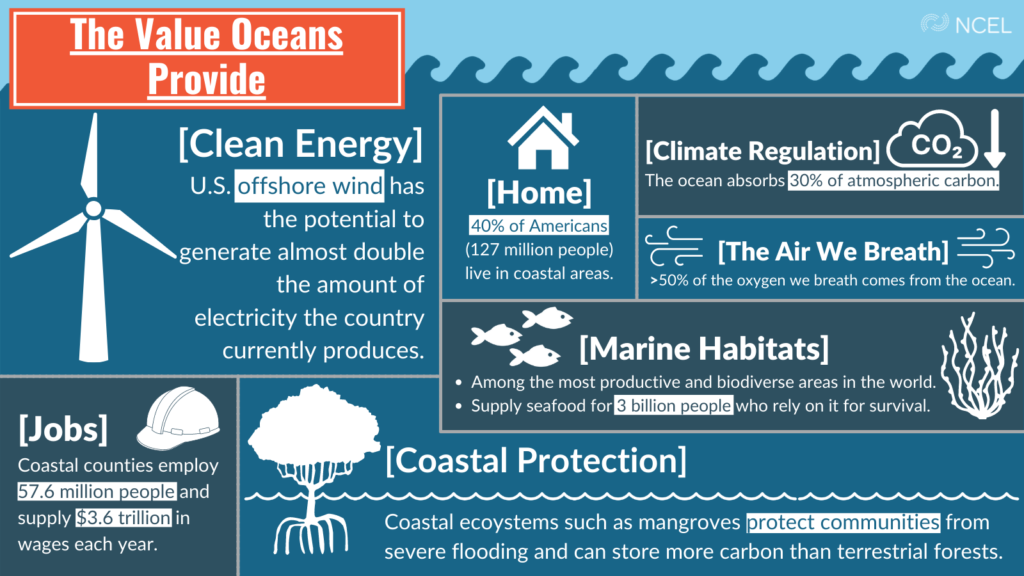
Press Release
State Legislators Form Group to Advance Ocean-Based Solutions
June 7, 2021
Legislators from 18 states form Coastal Working Group to Advance Ocean Climate Policy
Washington, D.C. – Today, state legislators from 18 states are forming the Coastal Working Group. This group will allow state legislators to share ocean climate policy ideas, strategies, and lessons learned. In celebration of this launch, legislators from five states highlighted their commitment to ocean-based solutions for climate action. States represented at the event included Hawaii, Maine, Massachusetts, New Hampshire, and Washington.
Legislators from the following states are participating in the Coastal Working Group: Alaska, California, Connecticut, Delaware, Florida, Georgia, Hawaii, Maine, Maryland, Massachusetts, Mississippi, New Hampshire, New York, North Carolina, Oregon, Rhode Island, Virginia, and Washington.
While the ocean has seen many consequences from climate change, the ocean also holds powerful solutions – from coastal habitats that protect coastlines and store carbon to untapped renewable energy with immense potential. Ocean-based solutions are critical for states and the nation to meet climate goals and create sustainable economies.
“Our coastal communities rely on a healthy ocean to support their local economies,” said Massachusetts State Representative Dylan Fernandes. “As climate change worsens and the composition of our oceans change, the livelihoods of thousands of people across the country are at risk. NCEL is leading the charge in promoting collaboration across state boundaries to create a sustainable future for our seaside cities and towns.”
While the country is at a turning point for the offshore energy transition and has a renewed focus on coastal resilience, states have been leaders in creating bold ocean climate policies for years. This is seen through state legislation to end offshore drilling, address ocean acidification, promote offshore wind, and ensure coastal resilience. View a full list of 2021 ocean climate policies from the Coastal Working Group.
States legislators know the risks that come from offshore drilling. An oil spill anywhere is an oil spill everywhere, not just the coastal residents but everyone who depends on the coasts for income and recreation. Offshore drilling means more greenhouse gas emissions and exacerbating the effects of climate change on communities. To date, 10 states have passed legislation prohibiting or limiting offshore drilling in state waters.
As legislators re-envision our ocean as a climate solution, the transition from offshore drilling to offshore wind is at the forefront. Offshore wind offers large potential as an energy source – able to power millions of homes and create thousands of jobs. This year, eight states considered legislation to encourage the development of offshore wind.
“Renewable offshore wind in the Gulf of Maine has extraordinary potential to produce clean energy and create thousands of jobs in construction, manufacturing, and support services,” said New Hampshire State Senator David Watters. “We can, with smart development, protect our fisheries and environment. New Hampshire has established an Offshore wind and Port Development Commission and is considering energy procurement legislation.”
Healthy coasts and oceans are crucial for addressing climate change. When coastal habitats are damaged they emit carbon back into the atmosphere. In addition to curbing carbon emissions, healthy coastal environments provide recreational opportunities, storm protection, nurseries for commercial and recreational fisheries, and are home to culturally important species.
“Like many, Washington state is a salmon state,” said Washington State Representative Debra Lekanoff. “Like many states, Washington state relies upon a prosperous and healthy salmon industry for commercial fishermen, for tribal fishermen, and for recreational fishermen.”
As states look towards our ocean for climate solutions, coastal restoration and resilience efforts can help reduce coastal erosion to the benefit of coastal communities.
“Reefs are often referred to as the rainforests of the oceans—providing carbon sinks and banks of biodiversity,” said Hawaii State Representative Nicole Lowen. “It is our responsibility, or as we say in Hawaii, our kuleana, to be the protectors of this resource not just for residents here in Hawaii, but for the entire planet.”

This Coastal Working Group provides state legislators a platform to convene, work together on policy approaches, share lessons learned, and identify best practices. Through the Coastal Working Group, these state legislators will also have a stronger voice in partnership with the federal government to ensure strong ocean climate policy.
“As our country’s coastal communities start to react to and plan for climate change impacts, state legislatures need to act to protect our interests without hurting our all-important natural coastal environments,” said Maine State Representative Lydia Blume. “As we consider offshore wind as part of our future energy solutions, the interests of other marine activities such as fisheries must be considered. Learning about the challenges and successes of other coastal states will help all of us come up with the best practices for climate mitigation and adaptation for our coastal communities.”
“These state legislators are committed to ensuring healthy oceans and coastal communities,” said Dylan McDowell, Deputy Director of the National Caucus of Environmental Legislators. “By acting together these legislators are able to enact strong and ambitious ocean climate policies that can be adopted by other coastal states. They are demonstrating the value in having state legislators work together across state lines.”
Created by and for state legislators, the National Caucus of Environmental Legislators is a 501(c)(3) nonprofit that organizes over 1,000 environmentally committed state legislators from all 50 states and both parties. NCEL provides venues and opportunities for lawmakers to share ideas and collaborate on environmental issues.
###
Contact: Dylan McDowell, NCEL Executive Director, dylan@ncelenviro.org